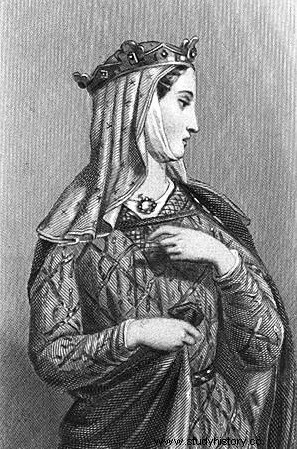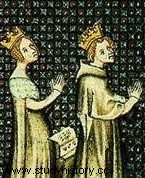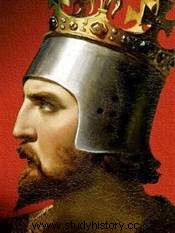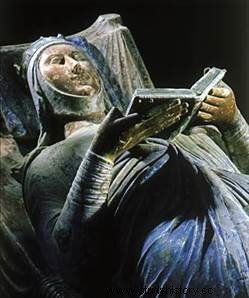 Alienor of Aquitaine , also known as Éléonore de Guyenne, was queen of France from 1137 to 1152 after her marriage to Louis VII, then queen of England from 1154 to 1204 after marrying Henri II Plantagenêt. Young “turbulent” girl, then mother of three kings, she overturned the male tradition of power by administering her lands and taking a preeminent role in public affairs. Seductive, it is at the origin of courtly love; intelligent and cultured, she protected troubadours, novelists and poets. Her recumbent figure is in the abbey church of Fontevraud where she took the veil at the end of her life and where she died on March 31, 1204.
Alienor of Aquitaine , also known as Éléonore de Guyenne, was queen of France from 1137 to 1152 after her marriage to Louis VII, then queen of England from 1154 to 1204 after marrying Henri II Plantagenêt. Young “turbulent” girl, then mother of three kings, she overturned the male tradition of power by administering her lands and taking a preeminent role in public affairs. Seductive, it is at the origin of courtly love; intelligent and cultured, she protected troubadours, novelists and poets. Her recumbent figure is in the abbey church of Fontevraud where she took the veil at the end of her life and where she died on March 31, 1204.
Eleanor of Aquitaine, a coveted princess
Alienor was born around 1123 near Bordeaux. Through her father Guillaume X and her mother Aliénor de Châtellerault, she was part of the dynasty of the Dukes of Aquitaine and will be the heiress of a rich area:Poitou, Saintonge, Angoumois, Marche, Limousin, Périgord, Guyenne and Gascony. The Duke of Poitiers, Guillaume IX, is undoubtedly the most illustrious of the princes of Aquitaine, also known for his talents as a troubadour. Initiator of a cultural movement that flourished in the 12th century, Guillaume allowed the emergence of literature in the Oc language alongside the extension of lyric poetry.
 Beautiful and attractive, a charming smile, a gentle look, noble manners, a lively and cultured mind, Eleanor loves parties and flowers. She was only fifteen years old when her father proposed her in marriage to the son of King Louis VI the fat, the future Louis VII:the king, ill, could die in peace. She welcomed her future husband, accompanied by five hundred gentlemen, to Bordeaux, where the marriage was celebrated on July 25, 1137, Louis VII becoming king in August of the same year. The new Queen Eleanor proves to be perfect:present at jousts and tournaments, she receives the nobility, welcomes and listens to the troubadours... while taking care of the management of the Duchy of Aquitaine alone. But she has ambition and wants power.
Beautiful and attractive, a charming smile, a gentle look, noble manners, a lively and cultured mind, Eleanor loves parties and flowers. She was only fifteen years old when her father proposed her in marriage to the son of King Louis VI the fat, the future Louis VII:the king, ill, could die in peace. She welcomed her future husband, accompanied by five hundred gentlemen, to Bordeaux, where the marriage was celebrated on July 25, 1137, Louis VII becoming king in August of the same year. The new Queen Eleanor proves to be perfect:present at jousts and tournaments, she receives the nobility, welcomes and listens to the troubadours... while taking care of the management of the Duchy of Aquitaine alone. But she has ambition and wants power.
Eleanor, Queen of France
Louis VII the Younger is a weak king, very devout. Little respected by his vassals, whose possessions are often more important than the royal domain, he puts himself aside from everything, no longer participating in anything, entrusting the government in part to Abbot Suger . Eleanor says "he is more monk than king", but their first daughter Marie de France was born in 1145 (she married the Count of Champagne Henri I and died in 1198). The king's only salvation lies in the crusade requested by Pope Eugene III in March 1146. Convinced by the words of Saint Bernard, Louis VII sets off for the Holy Lands, followed by his court and a “light and dissipated” Eleanor busy having fun. From Constantinople to Asia Minor, Aliénor discovers magnificent landscapes but… is ambushed by the Saracens near Iconium. Thanks to the knights, she survived and yet the bulk of the army was defeated.
 The king of France Louis arriving soon after is involved in the battle for four hours and fortunately finds Eleanor in Antioch, where they are royally received by the queen's uncle:Raymond de Poitiers , Duke of Antioch. The festivals have a special character due to the customs and usages of Asia, Eleanor indulges in the pleasure of these festivals and the king blames him for it. He finds the relationship between Eleanor and his uncle doubtful, he is indignant and decides to leave the place.
The king of France Louis arriving soon after is involved in the battle for four hours and fortunately finds Eleanor in Antioch, where they are royally received by the queen's uncle:Raymond de Poitiers , Duke of Antioch. The festivals have a special character due to the customs and usages of Asia, Eleanor indulges in the pleasure of these festivals and the king blames him for it. He finds the relationship between Eleanor and his uncle doubtful, he is indignant and decides to leave the place.
The queen refuses to leave and talks about separation, the situation escalates….but she must obey. The rumor is launched on the extramarital affairs of the queen…with her uncle. The king embarks for Europe thanks to the ships of the King of Sicily. Stopping then in Rome, he confides in the Pope, about Eleanor:he wants to repudiate her...
The failure of the marriage with Louis VII
Back in France, after four years of absence, Louis VII found his friend Abbé Suger who calmed him down, helped him with his worries and explained to him that he is strongly against this repudiation. The royal couple is reconciled and a second daughter is born in 1150:Alix who will marry the count of Blois Thibault le Bon and who will die in 1195. But Suger dies in January 1152, the king loses a friend full of wisdom and the situation worsens again in the couple. Finally, at Easter 1152, he presented his request before an assembly of prelates:a request for the nullity of the marriage.
The chancellor has this speech:“It is useless, he says, to insist on the sorrows of the king, and on what happened in Palestine; there is no one who does not know the rumors that have been circulating, and the king, who wants to respect the honor of this great princess, must not go into the truth of the facts, the certainty of which would oblige him to display all his severity. It depends on the queen herself. When she wished at Antioch to separate from the king her husband, she invoked kinship as proof of the nullity of her marriage; this is what the king submits to the judgment of the Assembly. If the relationship is proven, the union of Louis with Eleanor will be cancelled".
The Archbishop of Bordeaux then admits that kinship does indeed exist in the fourth degree through the women of Burgundy. The nullity is pronounced immediately during this Council of Beaugency. At the announcement of this news, Eleanor faints, then recovering herself she is surprised by the king's decision "Ah! Gentlemen, what have I done to the king why he wants to abandon me? How did I offend him? What fault did he find in my person? I am young enough for him, I am not sterile... I am rich enough; I have always obeyed him…”.
Quickly coming to her senses, at the head of Poitou and all of Aquitaine, she felt threatened with kidnapping (the Count of Anjou, Geoffroy Plantagenêt wanted to arrest her in order to marry her), fled Blois, passed through Tours and took refuge in Poitiers, in the hope of marrying Henri Plantagenêt, Duke of Normandy, brother of Geoffroy. Their first meeting had taken place in 1151 and had been very successful. He has everything to please the rich heiress:a demeanor announcing his high birth, golden blond hair, a soft look, an address for all the exercises of the body, at ease at court, he is twenty years old. Six weeks after the repudiation, Henri proposes to her.
Eleanor, Queen of England
 Although Louis VII made every effort to prevent this union, Eleanor married Henry in May 1152; the latter becomes king of England and takes the name of Henry II. Eleanor, Duchess of Normandy, Queen of England does not find happiness, her husband being fickle and moreover, he has no intention of leaving power to her! She just has the right to take care of the eight children who will be born:Guillaume (1153-1156); Henry the Younger (1155-1183); Mathilde (1156-1189) wife of Henry the Good, mother of Emperor Otho IV; Richard the Lionheart (1157-1199) King of England; Geoffroy (1158-1186) father of Arthur; Aliénor (1161-1214) wife of the King of Castile, mother of Blanche of Castile; Jeanne (1165-1199) wife of Guillaume II king of Sicily, then Raymond V count of Toulouse, becomes abbess of Fontevraud; Jean sans Terre (1166-1216) king of England to the detriment of Arthur.
Although Louis VII made every effort to prevent this union, Eleanor married Henry in May 1152; the latter becomes king of England and takes the name of Henry II. Eleanor, Duchess of Normandy, Queen of England does not find happiness, her husband being fickle and moreover, he has no intention of leaving power to her! She just has the right to take care of the eight children who will be born:Guillaume (1153-1156); Henry the Younger (1155-1183); Mathilde (1156-1189) wife of Henry the Good, mother of Emperor Otho IV; Richard the Lionheart (1157-1199) King of England; Geoffroy (1158-1186) father of Arthur; Aliénor (1161-1214) wife of the King of Castile, mother of Blanche of Castile; Jeanne (1165-1199) wife of Guillaume II king of Sicily, then Raymond V count of Toulouse, becomes abbess of Fontevraud; Jean sans Terre (1166-1216) king of England to the detriment of Arthur.
Furious, Eleanor makes scenes with her husband, going from anger to tenderness, even leading the children against their father, providing them with weapons, pushing them to ally with Scotland against him. She leaves England and retires to Poitiers , in the middle of his court of poets. Henry II, suspecting Aliénor of being the cause of the death of his former mistress Rosemonde and at the end of his patience, locks him up in prison for sixteen years, in Chinon, and in various castles in England.
She only left when her eldest son Richard the Lionheart, once on the throne after the death of Henry II in July 1189, freed her. From that day, still governing Aquitaine and Poitou, she visited her regions and decided to open all the prisons. While Richard Coeur de Lion is on a crusade, she assures the Regency and receives a more than warm welcome each time it passes through the various regions. But out of jealousy and a need for power, she ousts Richard's young bride, sister of Philippe Auguste:she doesn't want anyone else on the throne! Despite everything, she ends up accepting and negotiating the marriage of Bérangère d'Aragon and Richard.
A little later, she struggles and devotes herself body and soul to free Richard, who has just been captured and delivered to Emperor Henry VI, on his return from the crusade. She spares no effort to collect the enormous ransom demanded. Richard was released in February 1194, but a few years later he was wounded and died in Limousin in 1199.

End of life of Eleanor of Aquitaine in Fontrevaud
Reaching the end of her life, she left her inheritance to her grandson Henri III, then retired definitively to the Abbey of Fontevraud in Maine. There he takes the veil while making donations and alms to the poor. After a very eventful life, "the most beautiful and richest flower of Aquitaine, the incomparable pearl of the South died in March 1204 at the age of 82. She rests in Fontevraud, first alongside her husband, then her son Richard and her daughter-in-law Isabelle d'Angoulême (wife of Jean sans Terre). We can now see their four polychrome recumbent figures facing the high altar of the abbey.
Considered for a time by historians as the cause, through his conduct, his divorce and his remarriage, of three centuries of conflicts with England, today we perceive this famous figure in a different way. Eleanor of Aquitaine embodies the liberated woman of the 13th century, symbol of an enlightened and pleasant Middle Ages; however, some would like to present her as the archetype of the medieval princess, more to be pitied than admired. If Eleanor continues to arouse such strong positions, it is because she remains above all a central female figure in our history.
Bibliography
- Eleanor of Aquitaine:The Rebellious Queen by Jean Flori. Biography Payot, 2004.
- Eleanor of Aquitaine (new edition) by Régine Pernoud. Pocket, 1983.
- History of the Queens of France:Eleanor of Aquitaine by Philippe Delorme. Pygmalion, 2001.
